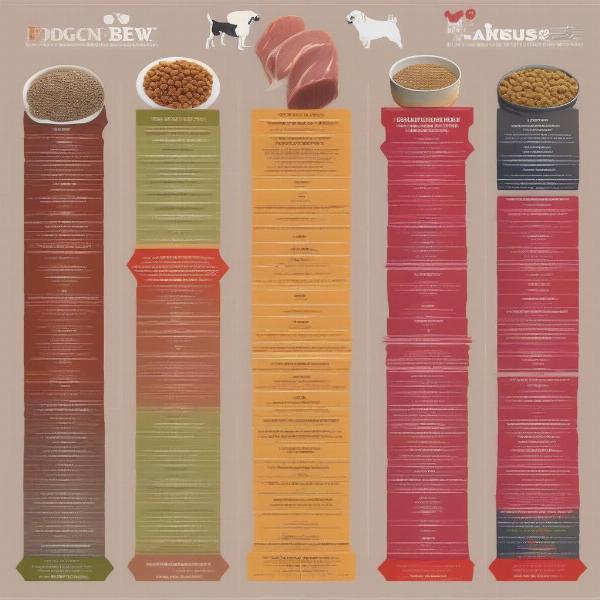All beef dog food has gained popularity among pet owners seeking a simple, protein-rich diet for their canine companions. But is an all-beef diet truly beneficial for your dog? This guide delves into the pros and cons of all-beef dog food, exploring nutritional value, potential health concerns, and important factors to consider when choosing this type of diet. We’ll also discuss alternatives and offer practical advice for ensuring your dog receives a complete and balanced diet.
Understanding the Appeal of All Beef Dog Food
Many pet owners are drawn to all-beef dog food due to its perceived simplicity and high protein content. Beef is a palatable protein source that dogs often enjoy. For owners seeking a limited ingredient diet, all-beef options can seem like a natural choice. However, it’s crucial to understand that “all beef” doesn’t necessarily equate to a complete and balanced diet.
Nutritional Value of All Beef Dog Food
While beef provides essential amino acids for muscle growth and repair, it lacks certain vitamins and minerals crucial for a dog’s overall health. A diet solely consisting of beef can lead to deficiencies in calcium, phosphorus, and essential fatty acids, among other nutrients.
Ensuring a Balanced Diet with All Beef Dog Food
If you’re committed to feeding your dog an all-beef diet, it’s essential to work with a veterinary nutritionist. They can help formulate a recipe that includes necessary supplements to prevent nutritional deficiencies. This might involve adding specific vitamins, minerals, and other essential nutrients to the beef. low fat dog treats can also be incorporated into a balanced diet.
Potential Health Concerns of an All Beef Diet
An all-beef diet can pose certain health risks for dogs. The high protein content can strain the kidneys, particularly in dogs with pre-existing kidney conditions. It can also contribute to obesity if not properly portioned. Additionally, some dogs may develop allergies to beef.
Is All Beef Dog Food Suitable for Puppies and Senior Dogs?
Puppies and senior dogs have specific nutritional requirements. An all-beef diet may not provide the necessary nutrients for healthy growth and development in puppies. Similarly, senior dogs may benefit from a diet lower in protein and higher in fiber. freeze dry dog treats might be a suitable alternative for senior dogs.
Choosing the Right All Beef Dog Food
If you opt for an all-beef dog food, carefully examine the ingredients list. Look for products that are supplemented with essential vitamins and minerals. Consult your veterinarian to ensure the chosen food meets your dog’s individual needs. You can also explore options like pure goodness dog food for a more balanced approach.
 Comparing All Beef Dog Food Brands
Comparing All Beef Dog Food Brands
Alternatives to All Beef Dog Food
Several alternatives offer a more balanced and complete nutritional profile than an all-beef diet. Commercial dog foods formulated by veterinary nutritionists provide all the essential nutrients a dog needs. Limited ingredient diets can be a good option for dogs with allergies or sensitivities. Consider exploring alternatives like virbac hypoallergenic dog food for dogs with allergies.
Conclusion
While an all-beef diet can be appealing, it’s crucial to prioritize your dog’s nutritional needs. Consult with your veterinarian or a veterinary nutritionist to determine whether an all-beef diet is appropriate for your dog and, if so, how to supplement it correctly. Remember, a balanced and complete diet is essential for your dog’s long-term health and well-being. You could also consider alternatives like comparable to blue buffalo dog food.
FAQ
-
Is all beef dog food good for all breeds? Not necessarily. Individual breeds may have different nutritional requirements.
-
Can I make my own all-beef dog food? Yes, but consult a veterinary nutritionist for a balanced recipe.
-
How much all-beef dog food should I feed my dog? Follow the feeding guidelines on the product packaging and consult your veterinarian.
-
What are the signs of nutritional deficiencies in dogs? Signs can include dull coat, skin problems, lethargy, and weight loss.
-
Is all-beef dog food more expensive than other types of dog food? It can be, depending on the brand and ingredients.
-
Can all-beef dog food cause digestive issues? Yes, especially if a dog is not used to a high-protein diet.
-
Are there any ethical concerns with feeding a dog an all-beef diet? Some people have concerns about the environmental impact of beef production.
ILM Dog is your trusted source for comprehensive and up-to-date information on dog care and nutrition. We offer expert advice on a wide range of topics, from breed selection and health care to training, nutrition, grooming, and product recommendations. Contact us today to learn more about how we can help you provide the best possible care for your furry friend. Email: [email protected], Phone: +44 20-3965-8624. Visit ILM Dog for more expert advice and resources.